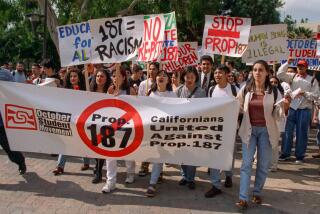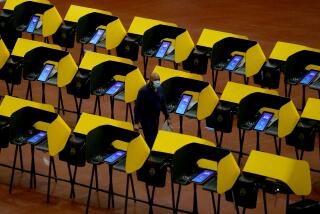Getting to the heart of voter apathy
- Share via
Why don’t more Americans vote? From 1920, when women first started voting, the percentage of voting-age citizens who voted for president rose steadily to a high, in 1960, of 62.8%. It has been falling since; in 1996 it was 48.9%; in 2000, 51.2%. Tuesday’s low voter turnout, especially in California, is no exception to that trend. Even as registering to vote has been made easier, Martin P. Wattenberg explains, the decline has continued.
“Where Have All the Voters Gone?” is a thorough review of the recent academic studies of the question. A professor of political science at UC Irvine, Wattenberg assesses the studies and adds a few conclusions on how to get more voters to the polls.
Does it matter that more people don’t vote? Wattenberg argues that it does. He believes that the interests of those who vote less in proportion to their chunk of the potential electorate, especially young people, are shortchanged by the political system. It is a circle, he says: Politicians don’t expect young people to vote, therefore candidates don’t appeal to them, therefore young people don’t find much to interest them in voting.
He argues that the same effect extends to poor and uneducated voters. Wattenberg believes, with many observers, that the decline in the importance of political parties is a major cause of the decline of voting. Before parties grew strong in the 1840s, voter participation was sporadic. The parties marshaled interest groups into powerful forces, and they gave voice and direction to the immigrants entering American life in rapidly increasingly numbers.
The rising level of education, and the increasing focus on candidates, especially fostered by television, has diminished the role of parties, Wattenberg writes. He doesn’t offer prescriptions for returning to the old party system. He does, though, put forth some modest plans.
Wattenberg argues that election day should be made a national holiday to encourage people too busy to vote. To those who say that adding another federal holiday would be wasteful, he endorses former President Jimmy Carter’s proposal of making Veterans Day election day.
Wattenberg thinks that American ballots are so complicated that they resemble SAT tests, and so frighten people away. Long lists of candidates and a multitude of state propositions and constitutional amendments have changed the ballot from the means for the voter to express his will toward a general direction of policy -- as by voting a straight party ticket -- to an examination of his opinions on a wide variety of subjects of which he may know little.
Among democracies, Wattenberg notes, Switzerland and the United States stand at the bottom of voter participation. In both cases, he says, voters are asked to decide a large number of public questions themselves, instead of through their representatives.
In advocating simpler ballots stripped of complex questions of public policy, Wattenberg ignores the reason such ballots came about. They were inspired by the Progressive movement to bypass state legislatures commonly corrupted by business interests and to put more power directly into the hands of the people.
In California, it was not until the election of Hiram Johnson as governor in 1911 and the reform of the ballot that the overwhelming power of the Southern Pacific Railroad and its allies was curbed. If the California ballot has become a poster boy of complexity, it, with its exemplary explanatory pamphlets, is also a model of a political system’s ability to take its voters seriously.
Are legislatures now so free of corruption that they can safely be entrusted with the public business without the check of a direct vote of the citizens? Wattenberg does not address this question. Nor does he examine the relative power of the money used to influence a legislature through campaign contributions and the money used to influence the voters through TV ads.
Wattenberg considers making voting compulsory, as Australia did in 1922, but he rejects the idea as incompatible with America’s individualistic political culture. He believes that Congress could constitutionally require television and radio stations, as a condition of their use of the public airwaves, to make air time available equally to all candidates, but believes that Congress will not do it.
To encourage more voting, Wattenberg is thus left with two proposals, the dubious one of cutting complex issues from the ballot and the simpler one of making election day a holiday, say on Veterans Day.
*
More to Read
Get the L.A. Times Politics newsletter
Deeply reported insights into legislation, politics and policy from Sacramento, Washington and beyond. In your inbox twice per week.
You may occasionally receive promotional content from the Los Angeles Times.










